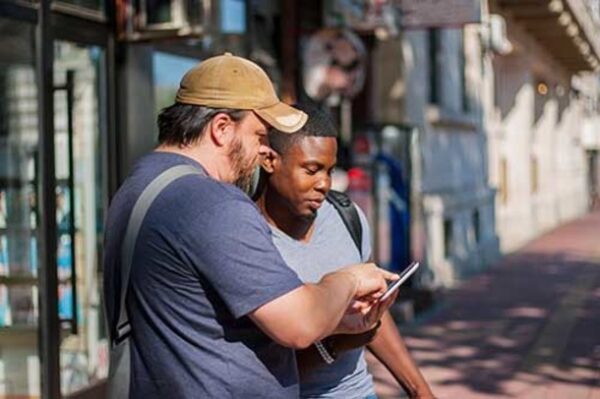

Asking for information when travelling, in English
Our previous article gave you examples of how you could make travel suggestions. We’re now going to show you some phrases you can use when asking for information.
You may need to go to a particular place or building when you are travelling. Use Is there … ? to ask if there is such a thing where you are. You may need to get someone’s attention before you can ask them a question. Use Excuse me to do this.
Excuse me , is there a garage near here? Is there a campsite near here? Is there anywhere with rooms to rent in this village? Is there a food shop in this street? Are there any restaurants around here?
You may want to find out the way to do something, for example how to buy a ticket. Use How do … ? .
Excuse me, how do I buy a ticket from this machine? How do I use this phone? How do I call a number in Germany? How do we get to the station?
If you are looking for somewhere and you want information about how to find it, use Where … ? .
Where is the train station? Excuse me, where is the ticket office? Where can I buy a ticket? Where is the town centre?
You may need advice when there are many choices and you need to know the right one for you. Ask Which … ? .
Which train do I take, please? Which bus goes to the town centre? Which platform is the train for London? Excuse me, which train goes to Barcelona?
If you want to ask a general question you can use Is it … ? .
Is it this way? Is it near here? Is it far? Is it on the right?
If you want to know the time that something happens, ask What time … ? .
What time does the train leave? What time do we get to Brussels? What time do we arrive in Portland? What time are we boarding?
If you want to ask how much time something takes, use How long … ? .
How long is the flight? How long does the journey take? How long does it take? How long will it take us to walk there?
If you want to ask how many times something happens, use How often do … ? .
How often do the trains go? How often do the trains to Cambridge go? How often do the buses to Edinburgh go?
If you want to ask about the money that you need to do something, use How much … ? .
How much is a ticket to Beijing? How much is a return ticket? How much does it cost to fly there? How much does it cost to hire a car?
Use Can I … ? to ask if you are allowed to do something.
Can I buy a ticket on the train? Can I leave my bags here? Can I change my ticket if I need to? Can I pay by credit card?
Useful words
a garage a place where you can have your car repaired a campsite a place where you can stay in a tent a room a separate area inside a building that has its own walls rent to pay the owner of something in order to be able to use it yourself a machine a piece of equipment that uses electricity or an engine to do a particular job a ticket office the place in a station that sells tickets a bus a large motor vehicle that carries passengers a platform the area in a train station where you wait for a train far a long way from somewhere the right the side that is towards the east when you look north board to get into a train, a ship or an aircraft to travel somewhere a journey an occasion when you travel from one place to another a return ticket a ticket for a journey to a place and back again a credit card a plastic card that you use to buy something and pay for it later
Next time, you’ll learn how to ask for things, such as tickets, or receipts.
Related Articles
Making suggestions when travelling, in english, talking about yourself in english, asking for information in english, 4 tips when starting to soften your english accent, making arrangements in english, other articles.

Making sure you’ve understood

Saying goodbye

Making a phone call
Sign up for the newsletter.
Get the latest news
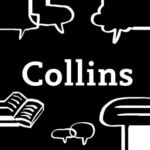
collins_dictionary_official
The home of living language. #wotd #wordlovers #collinsdictionary Read our word of the week definitions and blog posts:

collinsdictionary

Airport - Hotel
Buying tickets
Videos: airport, hotel ..
Travelling - tourism
Exercises - vocabulary 1.
AIRPORTS/AIRPLANES
- Airport 2: At the check desk
- Airport 3: At the check
- Airport: What's wrong?
- At the airport: Questions
- With flight attendants
- On the plane: What's wrong?
- Customs / immigration: Entering
- Customs / immigration: Questions
HOTELS/ACCOMMODATIONS
- Hotels - vocabulary exercises
- Hotel: General vocabulary 1
- Hotel: General vocabulary 2
- At the hotel 1: Checking in
- At the hotel 2: Checking in
- From the hotel into the city
- At the reception desk
- At the hotel 5: reservation
- Hotel 6: Asking directions
- What you like/don't like
- At the hotel: Questions

- English Conversation Lessons
- English Essay Topics
- English Autobiography Examples
- Report Writing
- Letter Writing
- Expansion of Ideas(English Proverbs)
- English Grammar
- English Debate Topics
- English Stories
- English Speech Topics
- English Poems
- Riddles with Answers
- English Idioms
- Simple English Conversations
- Greetings & Wishes
- Thank you Messages
- Premium Plans
- Student’s Log In
Travel Conversation Dialogues in English
Traveling exposes one to new sights, emotions, and experiences. Outings teach you a lot of things and modify your view on life. If you are fluent in English, you can go anywhere in the world and make many new acquaintances. Learn travel conversation dialogues as well as travel terminology to spice up your language ability and enjoy travelling to any region of the world.
If you find yourself stuck in the middle of nowhere, you will undoubtedly receive prompt assistance. Because your ability to communicate will aid you in locating and arriving at your desired location. So plan your route ahead of time and travel with confidence by learning travel conversation dialogues in English. Do not be scared of the obstacles; instead, continue to study and improve your English communication abilities , as they will come in handy in your life to manage any challenging scenario.
Travel Conversation Lessons Topics
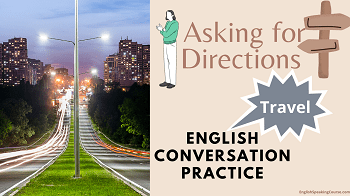
- Asking for Directions
It is extremely normal to get lost when travelling and then hunt for the right place. Wonderful travel talk between a tourist and a few bystanders guiding how to go to a place. Traveling is enjoyable, but it can be quite irritating when you are travelling overseas and are unable to obtain accurate directions.
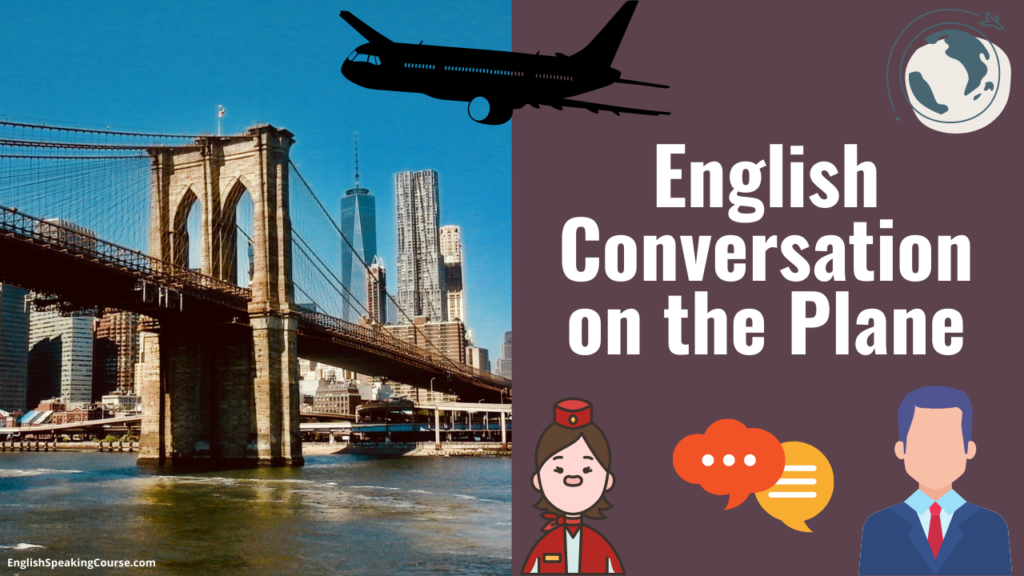
- Conversation on the Plane
Travelling and socializing are inextricably linked. Even while we’re on board, we talk to a lot of strangers, such as the flight crew or the flight attendant. However, it is critical to communicate with such folks nicely and respectfully. In conclusion, you will learn new dialogues concentrating on travel conversations to help you improve your language abilities.
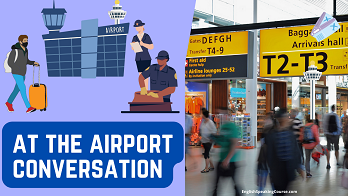
Conversation at the Airport
When checking in at the airport, this is a very frequent travel dialogue. Moreover, it is when you follow the method specified by the officials there. Get through the full procedure and communicate with the employees without becoming frustrated. Most importantly, don’t pass up any opportunity to converse in English and take it to the next level.
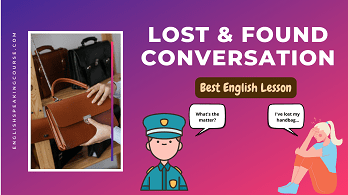
- Lost and Found Conversation
A simple yet odd conversation that everyone will, at some point in their lives, indulge in at least once. It is a conversation about lost and found items between a woman who has misplaced her handbag and a security guard whom she contacts in order to register her complaint.

Museum Vocabulary & Dialogues
This is a wonderful opportunity to improve one’s English language skills by studying museum vocabulary and dialogue. Using these vocabulary words and dialogues as a guide, you may improve your ability to communicate in English and practise having conversational exchanges. When you go to the museum the next time with your family or friends, make sure to take advantage of the opportunity to have some engaging dialogues.
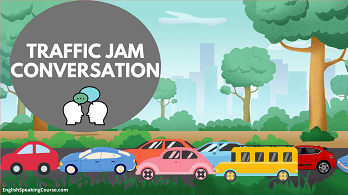
Conversation about Traffic Jam
In this Basic English speaking lesson, a father and a son are having a conversation about traffic jams. This problem is one that practically all of us face on a daily basis in our lives. Therefore, make the most of the opportunity to master the language associated with traffic and the accompanying conversations so that you may use it anytime you find yourself in a similar scenario.
Buy this Bundle Plan
Start Talking Perfect English Right Now!

Full English Speaking Course – All Lessons – Yearly Plan
Course Content for Students & Teachers:
100+ Video and Audio based English Speaking Course Conversations
12000+ Text & Audio based Frequently used Vocabulary & Dialogues with correct pronunciations
Full Grammar & 15000+ Solved Composition topics on Essay Writing, Autobiography, Report Writing, Debate Writing, Story Writing, Speech Writing, Letter Writing, Expansion of Ideas(Proverbs), Expansion of Idioms, Riddles with Answers, Poem Writing and many more topics
Plus Access to the Daily Added Content
Leave a Reply Cancel reply
You must be logged in to post a comment.

English Courses
- Mom & Son Breakfast Talk
- Dad & Son Breakfast Talk
- Going Out for Breakfast
- Healthy Breakfast Ideas
- Breakfast Table Conversation
- Talking about Household Chores
- Power Outage Conversation
- Speaking About Vegetables
- Talk About Television
- Telephone Conversation in English
- Renting an Apartment Vocabulary
- Talking about Pets
- Self Introduction Conversation
- Introduce Yourself in English
- Morning Walk Conversation
- Make New Friends Conversation
- English Speaking with Friends
- Conversation Between Siblings
- Talking about Smartphones
- Talking About City Life
- English Conversation on the Bus
- Talking about Dust Allergy
- Talking about Food Allergies
- Brushing Teeth Conversation
- Replacing Worn out Toothbrush
- Brushing Teeth with Braces
- Switching to Herbal Toothpaste
- Benefits of using Tongue Cleaner
- Talking about Illness
- Talking about Fitness and Health
- Talking About Fitness for Kids
- Visiting a Doctor Conversation
- Speaking about Lifestyle
- Conversation about Air Pollution
- Using an ATM Conversation
- Opening a Bank Account
- Car Accident Conversation
- Talking about Accident
- Exam Conversation with Kids
- At the Library Conversation
- Talking about Studies
- Offline vs Online School
- Internet Vocabulary and Dialogues
- Advantages of Homeschooling
- Inviting for Birthday Party
- Phone Conversation
- At the Airport Conversation
- Museum Vocabulary
- Conversation about Traffic
- Order Food Over the Phone
- At the Restaurant Conversation
- Talking about Music
- English Music Vocabulary
- Talk on Music Band
- Shopping for Clothes
- Buying a Smartphone
- Ordering Flowers Conversation
- English Conversation in Vegetable Market
- At the Supermarket
- At the Pharmacy
- Friends Talking about Chess
- Importance of Outdoor Activities
- Talking About Football
- Weekend Plans Conversation
- At the Beach Conversation
- New Job Conversation
- Business English Conversation
- Expressing Boredom in English
- English Conversation at the Salon
- English Speaking at the Bakery
- Talking About Studies
- Siblings Studying Together
- Speaking about Outdoor Activities
- Talk About Photography
- Essay on My School
- Essay on Summer Vacation
- Essay on Time Management
- Essay on Hard Work
- Essay on Health is Wealth
- Essay on Time is Money
- Republic Day Essay
- Essay on My Hobby
- Essay on Myself
- Essay on My Teacher
- Essay on My Best Friend
- Essay on My Family
- Essay on My Mother
- Essay on My Father
- Essay on Friendship
- Essay on Global Warming
- Essay on Child Labor
- Essay on Mahatma Gandhi
- Essay on Holi
- Essay on Pollution
- Essay on Education
- Essay on Air Pollution
- Essay on Communication
- Essay on Doctor
- Essay on Environment
- Essay on Gender Inequality
- Essay on Happiness
- Essay on Healthy Food
- Essay on My Favorite Festival Diwali
- Essay on My Favorite Sport
- Essay on My Parents
- Essay on Overpopulation
- Essay on Poverty
- Essay on Travelling
- Essay on Unemployment
- Essay on Unity in Diversity
- Essay on Water Pollution
- Essay on Water
- Essay on Women Empowerment
- Essay on Yoga
- Essay on Christmas
- Autobiography of a Book
- Autobiography of a Brook
- Autobiography of a Camera
- Autobiography of a Cat
- Autobiography of a Classroom
- Autobiography of a Coin
- Autobiography of a Dog
- Autobiography of a Doll
- Autobiography of a Farmer
- Autobiography of a Flower
- Autobiography of a Football
- Autobiography of a Haunted House
- Autobiography of a House
- Autobiography of a Kite
- Autobiography of a Library
- Autobiography of a Mobile Phone
- Autobiography of a Mosquito
- Autobiography of a Newspaper
- Autobiography of a Pen
- Autobiography of a Pencil
- Autobiography of a River
- Autobiography of a Table
- Autobiography of a Tiger
- Autobiography of a Tree
- Autobiography of an Umbrella
- Autobiography of Bicycle
- Autobiography of Bird
- Autobiography of Chair
- Autobiography of Clock
- Autobiography of Computer
- Autobiography of Earth
- Autobiography of Lion
- Autobiography of Peacock
- Autobiography of Rain
- Autobiography of a Soldier
- Autobiography of Sun
- Autobiography of Water Bottle
- Autobiography of Water Droplet
- Adopting a Village
- Teaching Children in an Adopted Village
- Programs Organized in an Adopted Village
- Volunteering in an Adopted Village
- Activities in an Adopted Village
- School Annual Day Celebration
- Republic Day Celebration
- Teachers Day Celebration
- World Environment Day Celebration
- Children’s Day Celebration
- Visiting the Wild Animal Rehabilitation Centre
- The Animal Sanctuary Visit
- Animal Shelter Visit
- Animal Rescue Center Visit
- Adult Literacy Camp
- Burglary of Jewelry
- India Wins Test Match
- School Children Affected by Food Poisoning
- Heavy Rains in Mumbai
- School Children Injured in Bus Accident
- Complaint Letter to the Chairman of Housing Society
- Request Letter to the Municipal Corporation
- Complaint Letter to the State Electricity Board
- Suggestion Letter to the Chief Minister
- Request Letter to the District Collector
- Request Letter to the Commissioner of Police
- Application Letter for an Internship
- Application Letter for a Job
- Request Letter for a Character Certificate
- Request Letter for a Better Lab and Library
- Global Warming Debate
- Animal Rights Debate
- Climate Change Debate
- Gun Control Debate
- Role of Religion in Society Debate
- Republic Day Speech
- Poems about Life
- Poems about Nature
- Poems for Boys
- Poems for Girls
- Poems for Mothers
- Poems for Friends
- Poems for Kids
- Poems about Trees
- Poems about Peace
- Funny Poems
- Poems About Climate Change
- Poems about Dreams
- Poems about Education
- Poems about Environment
- Poems about Eyes
- Poems about Family
- Poems about Fear
- Poems about Feminism
- Poems about Flowers
- Poems about Freedom
- Poems about Friendship
- Poems about Happiness
- Poems about History
- Poems about Hope
- Poems about India
- Poems about Joy
- Poems about Loneliness
- Poems about Love
- Poems about Night
- Poems about Power
- Poems about Water
- Poems about Women Empowerment
- Poems about Women’s Rights
- Poems on Earth
- Poems on Home
- Poems on Honesty
- Poems on Humanity
- Poems on Jungle
- Poems on Kindness
- Poems on Mental Health
- Poems on Moon
- Poems on Music
- Poems on Patriotism
- A Bad Workman Always Blames His Tools
- A Bird in the Hand is Worth Two in the Bush
- A Fool and His Money Are Soon Parted
- A Penny Saved is a Penny Earned
- A Picture is Worth a Thousand Words
- A Stitch in Time Saves Nine
- A Watched Pot Never Boils
- Absence Make the Heart Grow Fonder
- Actions Speak Louder than Words
- All Good Things Come to Those Who Wait
- All Good Things Must Come To an End
- All Is Fair in Love and War
- All That Glitters is Not Gold
- All’s Well That Ends Well
- An Apple a Day Keeps the Doctor Away
- An Empty Vessel Makes Much Noise
- An Idle Mind is Devil’s Workshop
- As You Sow, So Shall You Reap
- Barking Dogs Seldom Bite
- Beauty is in the Eye of the Beholder
- Beggars can’t be Choosers
- Better Late than Never
- Better the Devil You Know than the Devil You Don’t
- Birds of a Feather Flock Together
- Blood is Thicker than Water
- Boys will be Boys
- Charity Begins at Home
- Cleanliness is Next to Godliness
- Curiosity Killed the Cat
- Don’t Bite Off More than You Chew
- Don’t Bite the Hand that Feeds You
- Don’t Blow Your Own Trumpet
- Don’t Count your Chickens Before They Hatch
- Don’t Cry Over Spilled Milk
- Don’t Judge a Book by its Cover
- Don’t Put All Your Eggs in One Basket
- Don’t Put the Cart Before the Horse
- Don’t Throw The Baby Out With the Bathwater
- Early to Bed and Early to Rise Makes a Man Healthy, Wealthy, and Wise
- Easy Come, Easy Go
- Every Cloud Has a Silver Lining
- Every Dog Has His Day
- Fools Rush in Where Angels Fear to Tread
- Fortune Favors the Bold
- Give a Man a Fish, and You Feed Him for a Day; Teach a Man to Fish, and You Feed Him for a Lifetime
- Give Credit Where Credit is Due
- God Helps Those Who Help Themselves
- Half a Loaf is Better Than None
- Haste Makes Waste
- Health is Wealth
- Honesty is the Best Policy
- If at First You Don’t Succeed, Try, Try Again
- If It ain’t Broke, Don’t Fix It
- If the Shoe Fits, Wear It
- If you can’t Beat them, Join them
- If you Want Something Done Right, Do It Yourself
- Ignorance is Bliss
- It ain’t Over Till the Fat Lady Sings
- It Takes Two to Tango
- It’s a Small World
- It’s Always Darkest Before the Dawn
- It’s Better to Ask Forgiveness than Permission
- Its Better to Be Safe than Sorry
- It’s Better to Give than to Receive
- It’s Never Too Late to Mend
- It’s not What you Know, it’s Who you Know
- Jack of All Trades, Master of None
- Keep Your Friends Close and Your Enemies Closer
- Keep Your Mouth Shut and Your Eyes Open
- Kill Two Birds with One Stone
- Knowledge is Power
- Laughter is the Best Medicine
- Leave No Stone Unturned
- Let Sleeping Dogs Lie
- Life is a Journey, Not a Destination
- Life is Like a Box of Chocolates; You Never Know What You’re Gonna Get
- Like Father, Like Son
- Look Before You Leap
- Love Conquers All
- Make Hay While The Sun Shines
- Money Can’t Buy Happiness
- Money Doesn’t Grow on Trees
- Money Talks
- Necessity is the Mother of Invention
- No Man is an Island
- No Pain, No Gain
- Nothing Ventured, Nothing Gained
- One Man’s Trash is Another Man’s Treasure
- Out of Sight, Out of Mind
- Patience is a Virtue
- Practice Makes Perfect
- Prevention is Better than Cure
- Rome Wasn’t Built in A Day
- Slow and Steady Wins the Race
- The Early Bird Catches the Worm
- The Grass is Always Greener on the Other Side
- The Pen is Mightier Than the Sword
- The Proof of the Pudding is in the Eating
- There is No Place Like Home
- There’s No Time Like the Present
- Time Heals All Wounds
- Time is Money
- Too Many Cooks Spoil the Broth
- Two Heads are Better than One
- When in Rome, do as the Romans do
- Where There’s Smoke, There’s Fire
- You Can Lead a Horse to Water, But You Can’t Make it Drink
- You Can’t Have Your Cake and Eat It Too
- You Can’t Make an Omelet Without Breaking Eggs
- You Scratch My Back, And I’ll Scratch Yours
- You’re Never Too Old to Learn
- You’re Only As Strong As Your Weakest Link
- Parts of Speech
- Lola’s Dream
- Snowy Learns to Brave the Rain
- The Ant Explorer
- The Blind Archer
- The Brave Ant
- The Disguised King
- The Enchanted Blade
- The Enchanted Garden of Melodies
- The Endless Bag
- The Faithful Companion
- The Farmer’s Treasure
- The Frog and the Mischievous Fishes
- The Fruit Seller’s Fortune
- The Generous Monkey of the Forest
- The Gentle Giant
- A Blessing in Disguise
- A Dime a Dozen
- A Piece of Cake
- Apple of My Eye
- As Easy as Pie
- Back to the Drawing Board
- Beat Around the Bush
- Bite the Bullet
- Break a Leg
- Butterflies in My Stomach
- By the Skin of Your Teeth
- Caught Red-Handed
- Come Rain or Shine
- Cool as a Cucumber
- Cry over Spilled Milk
- Cut the Mustard
- Devil’s Advocate
- Down to the Wire
- Drink Like a Fish
- Eating Habits
- Supermarket
- Vegetable Market
- College Canteen
- Household Topics
- Diwali Festival
- Republic Day Wishes
- Birthday wishes for kids
- Birthday Wishes for Sister
- Birthday Wishes for Brother
- Birthday Wishes for Friend
- Birthday Wishes for Daughter
- Birthday Wishes for Son
- Women’s Day Wishes
- Thanks for Birthday Wishes
- Thank You Messages for Friends
- Thanks for Anniversary Wishes

Justin Morgan
Latest articles.
- Practical English Usage
- Overview of Babson University
- Babson University’s Entrepreneurship Program
- The Founding of Babson University
- Babson University’s Impact on the Global Economy
- Babson University’s Post-Pandemic Student Preparation
- Babson University’s Notable Alumni
- Babson University’s Business Research
- Campus Life at Babson University
- Babson University’s Leading Scholars and Experts
- Babson University’s Social Impact Program
- The Future of Babson University
- Top Programs at Cardiff University
- COVID-19 Research at Cardiff University
- Culture and Values of Cardiff University

Tourist English: Essential Phrases for Travelers(+Sample Conversation)
When traveling to a foreign country, one of the most important things to consider is communication. Tourist English is a simplified version of English that is used in the tourism industry to help visitors communicate with locals. It is a type of English that is easy to understand and learn, and it is specifically designed to help tourists get around and enjoy their trip.
Tourist English is not a separate language, but rather a set of vocabulary and phrases that are commonly used in the tourism industry. It is important to note that Tourist English is not the same as regular English. It is simpler, more direct, and has a lot of specific vocabulary and repetition.
One of the main reasons why Tourist English is important is that it helps tourists communicate with locals. When you are traveling in a foreign country, it is likely that you will encounter people who speak a different language. In such a situation, knowing Tourist English can be extremely helpful in getting around and communicating with locals.
Another reason why Tourist English is important is that it helps tourists understand the culture and customs of the country they are visiting. By learning some basic Tourist English phrases, you can show respect for the local culture and make a good impression on the locals.
To learn Tourist English, you can use a variety of resources, including dictionaries, phrasebooks, and language learning apps. These resources can help you learn the basic vocabulary and phrases that are commonly used in the tourism industry. It is also a good idea to practice speaking Tourist English with native speakers or other travelers.
Tourist English for Transportation
When traveling to a new place, transportation can be a major concern. Knowing some basic English phrases can help you navigate through different modes of transportation easily. In this section, we will cover Tourist English for transportation with sub-sections for At the Airport, Public Transportation, and Car Rentals.
At the Airport
When you arrive at the airport, you may need to communicate with airport staff and fellow passengers. Here are some useful phrases to help you get started:
- “Excuse me, where is the check-in counter?”
- “Could you please tell me where the baggage claim area is?”
- “Do I need to go through immigration?”
- “May I see your passport and boarding pass, please?”
- “What gate do I need to go to for my flight?”
Public Transportation
Using public transportation is an affordable way to get around in many places. Here are some phrases that can help you communicate with drivers and other passengers:
- “Does this bus/train go to [destination]?”
- “How much is the fare?”
- “Where is the nearest bus stop/train station?”
- “Could you please tell me when we arrive at [destination]?”
- “Excuse me, is this seat taken?”
Car Rentals
If you plan to rent a car during your trip, you will need to communicate with rental agents and other drivers on the road. Here are some phrases that can help you:
- “I would like to rent a car, please.”
- “Do you have any cars available?”
- “How much does it cost per day?”
- “Could you please give me directions to [destination]?”
- “Excuse me, where is the nearest gas station?”
By knowing these basic phrases, you can feel more confident when using different modes of transportation during your travels.
Tourist English for Accommodations
When traveling to a foreign country, it is essential to have some knowledge of tourist English, especially when it comes to accommodations. In this section, we will cover the basics of making reservations and communicating with hotel staff.
Making Reservations
Before your trip, you may want to make a reservation at a hotel or other accommodation. Here are some useful phrases to help you:
- “Do you have any available rooms for [date]?”
- “How much is the room per night?”
- “Can I have a room with a [specific feature]?”
- “What time is check-in and check-out?”
- “Can I cancel my reservation?”
When making a reservation, it is important to confirm the details, such as the dates, room type, and price. You may also want to ask about any additional charges, such as taxes or resort fees.
At the Hotel
Once you arrive at your hotel, you may need to communicate with the staff for various reasons. Here are some phrases to help you:
- “I have a reservation under [name].”
- “Can you recommend any restaurants or attractions nearby?”
- “Could you please bring me some extra towels/toiletries?”
- “What time is breakfast served?”
- “Is there a shuttle service to the airport?”
If you have any issues during your stay, such as a problem with your room or a lost item, don’t hesitate to speak to the hotel staff. They are there to help you and ensure you have a comfortable stay.
Tourist English for Dining
When traveling to a foreign country, dining out can be an enjoyable experience. However, it can also be challenging if you don’t speak the local language. Knowing some basic tourist English for dining can help you communicate with waiters and order food with ease.
At the Restaurant
When you arrive at a restaurant, you may be greeted by a host or hostess who will ask how many people are in your party. They may also ask if you have a reservation. If you don’t have a reservation, you can say “Table for two, please” or “Do you have any tables available?”
Once you are seated, a waiter will come to your table to take your order. You can start by saying “Can you recommend any dishes?” or “What do you recommend?” If you have any dietary restrictions, you can say “I’m a vegetarian” or “I’m allergic to peanuts.”
When ordering, you can say “I’ll have the steak, medium rare” or “I’d like the chicken, please.” If you want to customize your order, you can say “Can I have the salad without tomatoes?” or “Can you add extra cheese to my pizza?”
If you need anything during your meal, you can say “Excuse me” or “Waiter” to get your waiter’s attention. When you’re finished eating, you can ask for the bill by saying “Can we have the bill, please?” or “Check, please.”
If you’re looking for a quick snack or a cup of coffee, you may want to visit a cafe. When ordering coffee, you can say “I’ll have a latte, please” or “Can I get a cappuccino?” If you want a snack, you can say “I’ll have a croissant” or “Do you have any pastries?”
When visiting a bar, you can order a drink by saying “I’ll have a beer, please” or “Can I get a margarita?” If you’re not sure what to order, you can ask the bartender for a recommendation by saying “What do you recommend?”
Tourist English for Sightseeing
When you’re traveling to a new city or destination, sightseeing can be one of the most exciting parts of your trip. To make the most of your time and experience, it’s helpful to have some basic Tourist English phrases and vocabulary for sightseeing. This section will cover Visiting Attractions, Nature and Outdoor Activities.
Visiting Attractions
When visiting attractions such as museums, landmarks, or monuments, it’s important to know how to ask for information and tickets. Here are some useful phrases:
- “Excuse me, where can I find the museum?”
- “How much is the entrance fee?”
- “Can I get a brochure or leaflet about the attraction?”
- “What are the opening hours?”
You can also use phrases like “Is there a guided tour available?” or “Can you recommend any other attractions in the area?” to get more information and make the most of your visit.
Nature and Outdoor Activities
If you’re interested in experiencing the natural beauty of a place or participating in outdoor activities, there are some specific Tourist English phrases you should know. Here are a few examples:
- “Where is the nearest park or nature reserve?”
- “Can you recommend any hiking trails or scenic routes?”
- “Is there a bike rental service nearby?”
- “What outdoor activities are available in the area?”
Using these phrases can help you get the information you need to plan your outdoor activities and make the most of your time.
Remember, when sightseeing, it’s important to be respectful of the local culture and customs. Use polite phrases like “please” and “thank you” when asking for information or assistance. With these basic Tourist English phrases and vocabulary, you’ll be able to communicate effectively and make the most of your sightseeing experience.
Tourist English for Shopping
When traveling to a new place, shopping can be both exciting and challenging. You may want to buy souvenirs, gifts for loved ones, or simply browse local shops. To make your shopping experience more enjoyable, it’s helpful to know some basic Tourist English.
Firstly, it’s important to know how to ask for what you want. Here are some useful phrases to use when shopping:
- “Excuse me, do you have [item]?”
- “Could you show me where the [item] is?”
- “How much does this cost?”
- “Do you accept credit cards?”
When looking for a specific size or color, you can use the following phrases:
- “Do you have this in [size/color]?”
- “I’m looking for something in [size/color].”
If you’re not sure about the quality or material of an item, you can ask:
- “What is this made of?”
- “Is this item durable?”
When you’re ready to make a purchase, here are some phrases to use at the checkout:
- “How much is this?”
- “Can I get a discount?”
- “Do you have a gift receipt?”
Remember to always be polite and respectful when talking to shopkeepers. Using Tourist English can help you communicate your needs and make your shopping experience more enjoyable.
Tourist English for Socializing
When traveling, it’s not just about visiting new places and trying new foods. It’s also about meeting new people and making connections. By learning some basic Tourist English phrases for socializing, you can make your trip more enjoyable and memorable.
Small talk is a great way to break the ice and start a conversation with someone new. Here are some common Tourist English phrases for small talk:
- “Hi, how are you?”
- “What brings you to (insert destination)?”
- “Have you tried the local cuisine yet?”
- “What do you recommend seeing or doing here?”
- “Do you have any travel tips to share?”
Remember to smile and be friendly when initiating small talk. It’s a universal language that can help you connect with people from all over the world.
Recommendations
Asking for recommendations is another great way to strike up a conversation with locals or fellow travelers. Here are some Tourist English phrases for asking and giving recommendations:
- “Can you recommend a good restaurant/bar/cafe?”
- “What’s your favorite thing to do in (insert destination)?”
- “Do you know of any hidden gems or off-the-beaten-path attractions?”
- “I’m looking for (insert activity). Any suggestions?”
- “Thanks for your recommendation. I’ll definitely check it out!”
By asking for recommendations, you can discover new places and experiences that you may not have found on your own. And by giving recommendations, you can share your own travel knowledge and help others have a great trip.
In conclusion, learning some basic Tourist English phrases for socializing can help you make the most of your travel experience. Whether it’s small talk or recommendations, don’t be afraid to step out of your comfort zone and connect with new people.
Tourist English for Emergencies
Emergencies can happen anytime and anywhere, and it is important to be prepared and know how to communicate in English in case of an emergency. Here are some useful phrases and vocabulary to help you in case of an emergency situation during your travels:
- Call for Help: If you need to call for help, dial the emergency number for the country you are in. In the UK, the emergency number is 999. When calling, state your name, location, and the nature of the emergency clearly and calmly.
- Medical Emergencies: If you need medical attention, you can say “I need a doctor” or “I need an ambulance”. If you have a specific medical condition or allergy, it is important to carry a card or document with this information in English to show to medical personnel.
- Lost or Stolen Items: If you have lost your passport, wallet, or other important items, report it to the police and your embassy or consulate immediately. You can say “I lost my passport/wallet” or “My passport/wallet was stolen”.
- Accidents and Crime: If you witness or are involved in an accident or crime, call the emergency number and report it to the police. You can say “There has been an accident/crime” or “I saw an accident/crime”.
- Evacuation and Shelter: In case of a natural disaster or other emergency, you may need to evacuate or find shelter. Ask for help and follow instructions from local authorities. You can say “Where is the nearest shelter/evacuation center?” or “I need help evacuating”.
It is important to stay calm and clear when communicating in an emergency situation. Speak slowly and use simple English to ensure that you are understood. Remember to carry important documents and contact information with you at all times, and familiarize yourself with the emergency procedures and resources in the country you are visiting.
Tourist English in the Tourism Industry
As a professional in the tourism industry, you will likely encounter travelers from all over the world. To communicate effectively with them, it is essential to have a good understanding of Tourist English.
Jobs in Tourism
Many jobs in the tourism industry require proficiency in English to communicate with tourists. For instance, tour guides, hotel staff, and transportation services personnel must be able to communicate with tourists fluently. As a receptionist in a hotel, you will need to have excellent communication skills to provide information about the hotel’s services, tourist attractions, and the local area.
In addition, Tourist English is necessary for effective communication with tourists to ensure that they feel comfortable and welcome. It is essential to be able to answer questions about the local area, provide directions, and make recommendations for restaurants and tourist attractions.
30 Tourist English Phrases
When you’re traveling to a foreign country, it’s always helpful to know some basic English phrases to communicate with locals. Here are 30 tourist English phrases that will help you get by in most travel situations:
- Do you speak English?
- I don’t understand
- Can you repeat that, please?
- How much does it cost?
- Where is the bathroom?
- Can you recommend a good restaurant?
- I would like to order…
- Can I have the bill, please?
- Is there a pharmacy nearby?
- I need a doctor
- Can you help me?
- Where is the nearest ATM?
- How do I get to…?
- Can I take a picture?
- What time is it?
- Can you show me on the map?
- What is your name?
- Nice to meet you
- Where are you from?
- How long are you staying?
- What is there to do around here?
- Can you give me directions?
- Have a good day!
These phrases will come in handy in a variety of situations, from ordering food to asking for directions. Remember to speak slowly and clearly, and don’t be afraid to use gestures or point to things if you’re having trouble communicating. With these phrases in your arsenal, you’ll be able to navigate most travel situations with ease.
Tourist English Conversations
When traveling to a foreign country, it’s essential to know some basic English phrases to communicate with locals and other tourists. Here are some common English conversations that you might encounter during your travels:
- “Hello, how are you?”
- “My name is [your name]. What’s your name?”
- “Nice to meet you.”
- “Excuse me, can you tell me how to get to [location]?”
- “Is there a [restaurant/bank/hotel] nearby?”
- “Which way is [location]?”
- “I’ll have the [dish/drink] please.”
- “Can I have the bill, please?”
- “Could you bring me some water, please?”
- “Where are you from?”
- “What do you do for a living?”
- “Do you have any hobbies or interests?”
Remember to speak slowly and clearly, and don’t be afraid to ask someone to repeat themselves if you don’t understand. Using these simple English phrases can help you navigate your travels more easily and make meaningful connections with people from all over the world.
Related posts:
- Birds Of A Feather Flock Together (Meaning And Correct Use)
- Have Fun or Enjoy? What’s the Difference?
- What does “I Can Relate” mean in English?
- The Correct Usage of “Get in the Car” vs. “Get into the Car”

Airport English: Conversation Lesson
Need to speak English at the airport? This travel English lesson will teach you phrases from English conversations! Study each dialogue at the airport and then read my explanation of the phrases in each English conversation.
This is a sample lesson from the Everyday English Speaking Course. You can register to get all 45 lessons in the course!
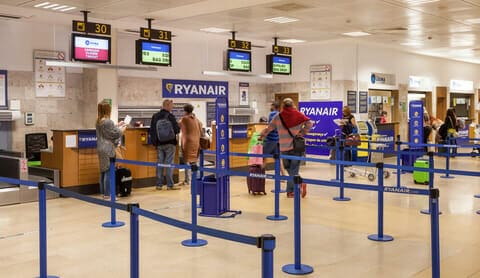
Airport English Conversation #1 – At the Check-In Desk
Dan is flying from New York to Los Angeles. When he arrives at the airport, he goes to the check-in desk. Listen to the conversation he has with the agent:
Agent: Good afternoon! Where are you flying to today?
Dan: Los Angeles.
Agent: May I have your passport, please?
Dan: Here you go.
Agent: Are you checking any bags?
Dan: Just this one.
Agent: OK, please place your bag on the scale.
Dan: I have a stopover in Chicago – do I need to pick up my luggage there?
Agent: No, it’ll go straight through to Los Angeles. Here are your boarding passes – your flight leaves from gate 15A and it’ll begin boarding at 3:20. Your seat number is 26E.
Dan: Thanks.
Download this lesson:
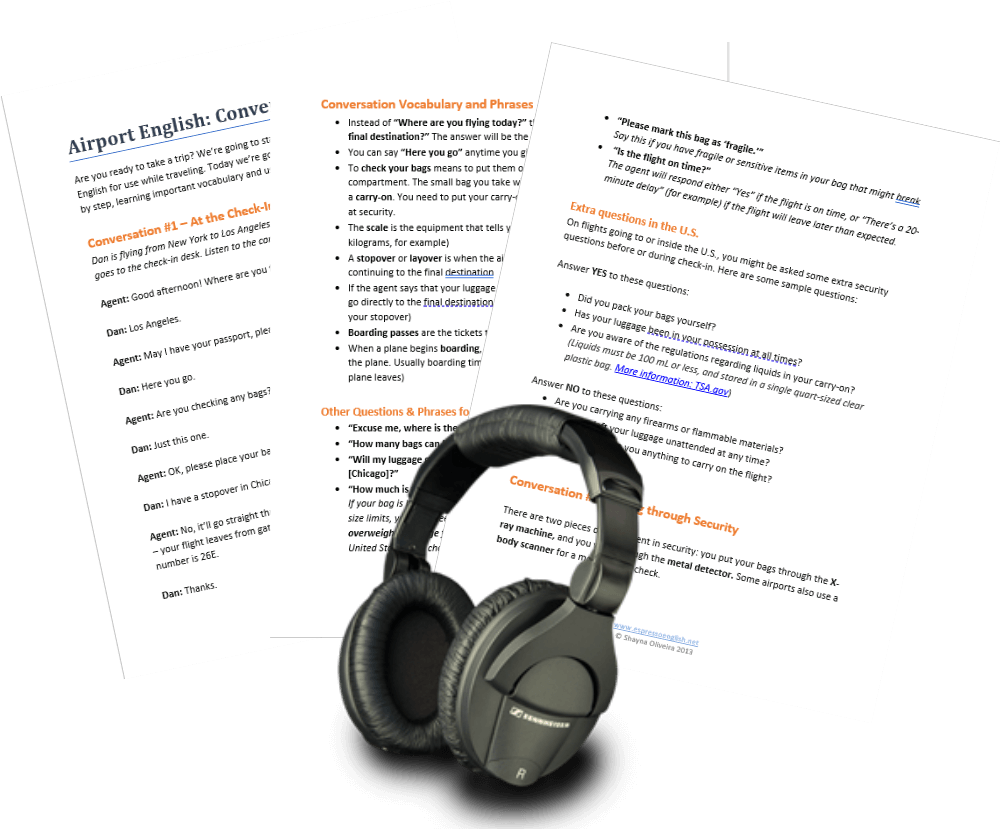
Yes! I want the PDF + Audio + Quiz
Conversation Vocabulary and Phrases
- Instead of “Where are you flying today?” the agent may ask “What’s your final destination?” The answer will be the same!
- You can say “Here you go” anytime you give something to somebody
- To check your bags means to put them on the airplane inside the cargo compartment. The small bag you take with you on the airplane is called a carry-on . You need to put your carry-on bags through the X-ray machine at security.
- The scale is the equipment that tells you the weight of your luggage (45 kilograms, for example)
- A stopover or layover is when the airplane stops in a different city before continuing to the final destination
- If the agent says that your luggage will go straight through , it means it will go directly to the final destination (and you don’t need to pick it up during your stopover)
- Boarding passes are the tickets that permit you to enter the airplane
- When a plane begins boarding , it means that the passengers start to enter the plane. Usually boarding time is 30-60 minutes before takeoff (when the plane leaves)
Other Questions & Phrases for the Airport
- “Excuse me, where is the American Airlines check-in desk?”
- “How many bags can I check?”
- “Will my luggage go straight through, or do I need to pick it up in [Chicago]?”
- “How much is the fee?” If your bag is heavier than the weight limits, or if your bag is larger than the size limits, you may need to pay extra: an oversized baggage fee or overweight baggage fee (this can be $75 to $300) . Some airlines in the United States also charge a fee for ALL checked bags (usually $15 to $30).
- “Please mark this bag as ‘fragile.’” Say this if you have fragile or sensitive items in your bag that might break
- “Is the flight on time?” The agent will respond either “Yes” if the flight is on time, or “There’s a 20-minute delay” (for example) if the flight will leave later than expected.
Extra questions in the U.S.
On flights going to or inside the U.S., you might be asked some extra security questions before or during check-in. Here are some sample questions:
Answer YES to these questions:
- Did you pack your bags yourself?
- Has your luggage been in your possession at all times?
- Are you aware of the regulations regarding liquids in your carry-on? (Liquids must be 100 mL or less, and stored in a single quart-sized clear plastic bag) More information: TSA.gov
Answer NO to these questions:
- Are you carrying any firearms or flammable materials?
- Have you left your luggage unattended at any time?
- Has anyone given you anything to carry on the flight?
Airport English Conversation #2 – Going through Security
There are two pieces of equipment in security: you put your bags through the X-ray machine, and you walk through the metal detector. Some airports also use a body scanner for a more careful check.
The X-ray machine has a conveyor belt that moves your bags automatically through the machine. You can put small items like keys or money into plastic bins.
In the picture below, the woman is walking through the metal detector. Her suitcase is on the conveyor belt after going through the X-ray machine.
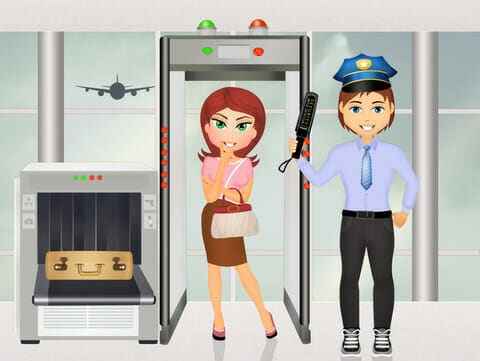
Agent: Please lay your bags flat on the conveyor belt, and use the bins for small objects.
Dan: Do I need to take my laptop out of the bag?
Agent: Yes, you do. Take off your hat and your shoes, too.
(he walks through the metal detector)
[BEEP BEEP BEEP BEEP]
Agent: Please step back. Do you have anything in your pockets – keys, cell phone, loose change?
Dan: I don’t think so. Let me try taking off my belt.
Agent: Okay, come on through.
(he goes through the metal detector again)
Agent: You’re all set! Have a nice flight.
The phrase “you’re all set” is a common expression that means “you’re finished and everything is OK.”
Phrasal Verbs: SET OFF and GO OFF
When the alarm sounds, we say “the alarm went off.” To describe what caused the alarm to sound, we say “set off” – for example, “My keys set off the alarm” or “My keys set off the metal detector.”
Airport English: Announcements at the Gate
Airports are divided into terminals (the major sections of the airport) and each terminal has many gates. The gate is the door you go through to enter the airplane. Here are a few announcements you might hear while you are at the gate, waiting for the plane to board.

- “There has been a gate change.” (this means the flight will leave from a different gate)
- “United Airlines flight 880 to Miami is now boarding.” (this means it’s time for passengers to enter the plane)
- “Please have your boarding pass and identification ready for boarding.”
- “We would like to invite our first- and business-class passengers to board.”
- “We are now inviting passengers with small children and any passengers requiring special assistance to begin boarding.”
- “We would now like to invite all passengers to board.” (this means everyone can enter the plane)
- “This is the final boarding call for United Airlines flight 880 to Miami.” (this means it is the FINAL OPPORTUNITY to enter the plane before they close the doors)
- “Passenger John Smith, please proceed to the United Airlines desk at gate 12.”

500+ Real English Phrases
Airport English Conversation #3: On the plane
The people who work inside the airplane serving food and drinks are called flight attendants. Both men and women who have this job are called flight attendants. Listen to this conversation that Dan has with the flight attendant when dinner is served on the flight.

Dan: Sorry?
Flight attendant: Would you like chicken or pasta?
Dan: I’ll have the chicken.
Flight attendant: Anything to drink?
Dan: What kind of soda do you have?
Flight attendant: Coke, Diet Coke, Sprite, Orange, and Dr. Pepper.
Dan: A Diet Coke, no ice, please.
Flight attendant: Here you go.
English Conversation Tips:
If you didn’t understand what the flight attendant said, you can say Sorry? or Pardon? to ask him or her to repeat it.
If you want to ask for something, you can use the phrase “Can I have…?” or “Could I have…?” Practice your pronunciation with these common requests:
- “Can I have a pillow?”
- “Can I have a blanket?”
- “Can I have a pair of headphones/earbuds?”
- “Could I have some water/coffee/tea?”
- “Could I have some extra napkins?”

Finally, if you need to stand up, but there is a person sitting between you and the aisle, you can say Excuse me and make a motion to start standing up. The person sitting next to you will understand and stand up to let you get out of your seat.
You’ve finished Lesson 16! I hope you’ve enjoyed these English conversations at the airport. Now take the quiz to test how well you remember the airport English phrases.
In tomorrow’s lesson, you’ll learn from more English conversations at the airport – phrases for arriving at the destination airport, going through immigration, and dealing with common travel problems.
Quiz: Travel English at the Airport
Congratulations - you have completed Quiz: Travel English at the Airport .
You scored %%SCORE%% out of %%TOTAL%%.
Your performance has been rated as %%RATING%%
This is a free sample lesson from the Everyday English Speaking Course Level 1
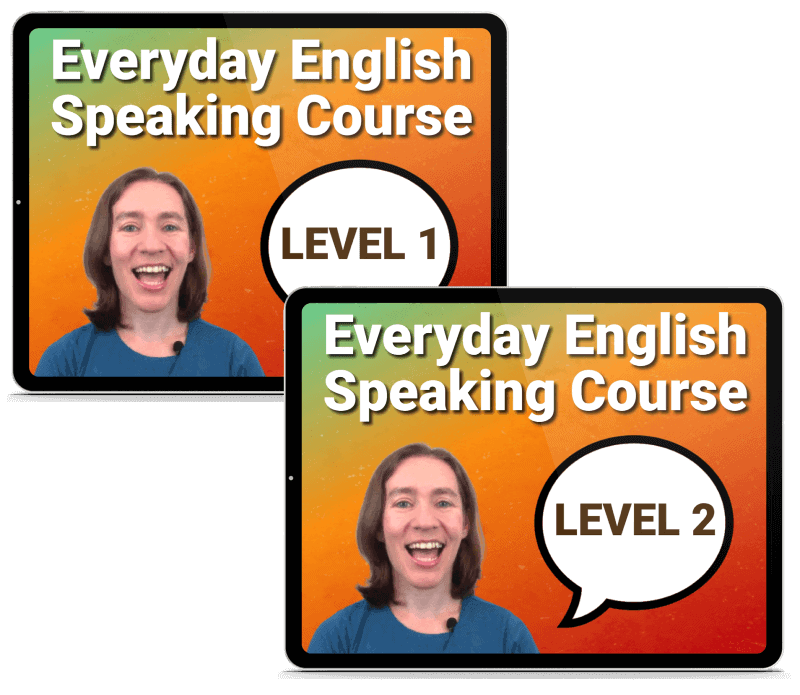
More Espresso English Lessons:
About the author.
Shayna Oliveira
Shayna Oliveira is the founder of Espresso English, where you can improve your English fast - even if you don’t have much time to study. Millions of students are learning English from her clear, friendly, and practical lessons! Shayna is a CELTA-certified teacher with 10+ years of experience helping English learners become more fluent in her English courses.
Asking for travel information.EP1. (pg.24).
Loading ad...
Listening task about asking travel information.
- Google Classroom
- Microsoft Teams
- Download PDF
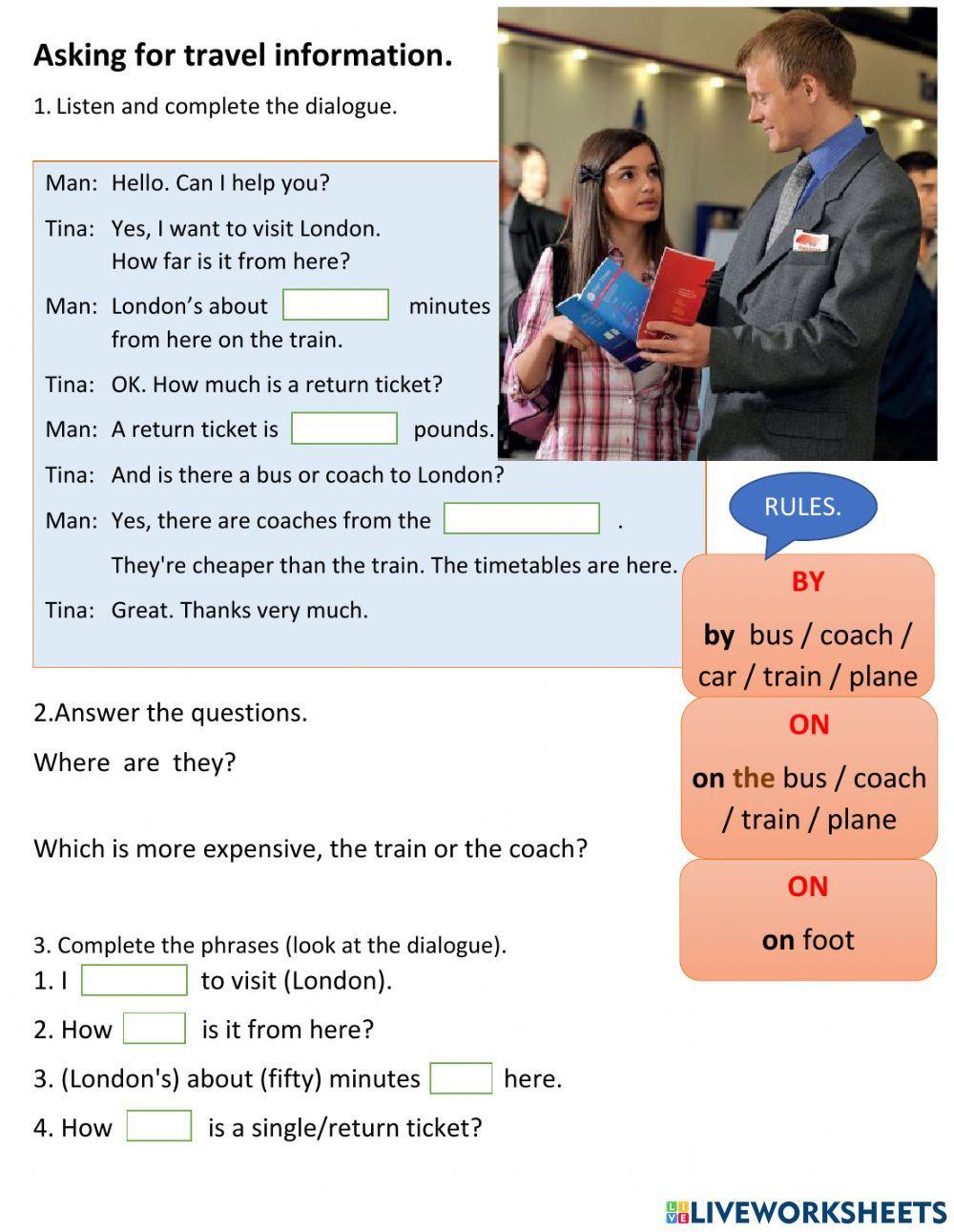
EnglishPost.org
60 Travel Conversation Questions
One of the dreams that people have is to travel around the world and know more places, meet new people and enjoy some adventures.
People love traveling and there are many reasons for doing so, such as:
How about you? What are your reasons for traveling?
Talk about it with this list of travel conversation questions
Table of Contents
Travel Conversation Questions: Places
Travel conversation questions: people, travel conversation questions: your next vacations, travel conversation questions: your last vacation, travel conversation questions: your luggage, travel conversation questions: preferences, travel conversation questions: general questions, travel questions: channels, travel questions: safe places, more esl conversation questions.
Instead of having a long list of travel conversation questions, it is better to have them categorized to make everything easier.
These are 60 travel conversation questions that have been divided into different categories such as:
Let’s explore each one of these different categories
When we search on the internet, we can find a list of recommendations about places to visit.
These are conversation questions to discuss the best and worst places to visit:
- Have you ever been abroad?
- How many countries have you visited?
- Have you visited many touristic places in your country?
- What tourist places do you like to visit?
- Do you prefer visiting beaches or mountains?
- Have you ever visited a European country?
- Have you ever visited an African country?
- What’s your best vacation memory?
- What’s your worst vacation memory?
- What countries would you like to visit?
- What countries would you not like to visit?
- What’s the best place for a vacation in your country
I understand that some people like traveling alone but others prefer some company and have better memories.
These questions have to do with your favorite people to go on vacation:
- Who do you travel with?
- Have you made friends while you are on vacation?
- Do you like to travel with children?
- Do you like to travel with your parents?
- Do you like traveling alone or in a group?
- What are some of the benefits of traveling alone?
Some people plan their vacation since they have to ask for permission, save money and choose the best time of the year to do it.
These questions will help you talk about plans that you have for your next vacation:
- What places are you planning to visit?
- Who are you planning to go with?
- When are you planning to go?
- Where are you planning to stay?
- What sights are you planning to see?
- When will you next go to the beach? Which beach is your favorite?
Some people love sharing information about their last vacation and some people don’t.
These are some questions to discuss your last vacation
- Where did you go on your last vacation?
- Who did you go with?
- Where did you stay?
- What did you do there?
- What did you see there?
- How much money did you spend there?
- Who was the most interesting person you met?
- How long did you stay there? Did you want to stay longer?
Most people don’t have a problem with their luggage when they travel, while others find issues such as:
These are some conversation questions that have to do with preparing stuff to travel:
- How much luggage do you usually carry?
- Do you bring electronic devices when you travel?
- What are some things you always take with you on a trip?
- Do you like to pack light when you travel?
- Do you think that everyone overpacks?
- How many of the things do you pack do you actually use or need?
- Have you ever lost your luggage?
- Do you worry about your luggage when you travel?
These are some questions about what you prefer to do when you are on vacation:
- Do you prefer to travel by car or plane?
- Have you ever bought a package tour?
- Where do you prefer to stay when you go on a vacation?
- How often do you travel?
- How often do you go camping?
- How long do you like vacations to be?
- What means of transport do you like to use when you are on vacation?
- Do you like to try local food when you travel?
- What is the best age to travel?
- Where do you like to stay when you go on vacation?
These are some general questions about traveling:
- Are you a traveler?
- What do you miss the most when you are traveling?
- Have you ever had an accident while traveling?
- Have you ever been on a cruise?
- What do you think about hitchhiking?
- If money was not an issue, what type of holiday would you take?
- Have you ever missed a flight? What happened?
Travel blogs and YouTube channels have become very popular.
Channels tend to have an edge over travel blogs since you get a better idea of the country you are planning to visit
- Do you follow travel blogs?
- Do you follow Travel Youtube channels?
- Do you usually search for videos or posts about the countries or places you are trying to visit?
- Have Travel blogs or channels make you want to travel more
If you are a traveler, you don’t want anything to happen to you, your friends, and your family.
These are some questions about safe countries and places to travel to:
- What are some of the safest places to travel to?
- Have you ever been robbed when traveling?
- Do you only travel to the safest countries?
- Do you share your travel information with someone you trust?
- Do you worry about how much you drink when traveling?
- Do you try not to draw attention when traveling?
- Do you wear jewelry when you travel?
- Are you aware of scams when you travel?
- Do you Keep digital copies of important documents?
Did you find these travel conversation questions useful?
This is one of our newest sections. Use these questions to promote speaking in the classroom.
- 50 Conversation Questions about Entertainment
- Conversation Questions about Careers and Jobs
- Social Networks Conversation Questions
- 50 Conversation Questions about Computers
- 70 Music Conversation Questions
- 30 Brilliant Conversation Starters for the ESL Classroom
- 70 School Conversation Questions
- 100 Great Health Conversation Questions
- 32 Immigration Discussion Questions
- Friends Conversation Questions
- ESL Conversations: 50 Conditional Questions
If there are travel conversation questions that you would like me to add, send them via Facebook messenger
I am Jose Manuel, English professor and creator of EnglishPost.org, a blog whose mission is to share lessons for those who want to learn and improve their English
Related Posts

30 Discussion Questions about Pollution

Discuss Questions about the Environment

Questions about Money for the ESL Classroom
- Excellent ESL 4U Blog
- ESL Learning Tips
- Free ESL Book
- ESL Conversations
- ESL Conversation Cards
- 80 Conversation Cards
- ESL Flashcards
- ESL Listening
- ESL Reading
- ESL Vocabulary
- ESL Writing
- Free ESL Worksheets
- ESL Printables
- Idioms Worksheets
- ESL for Kids
- ESL Kids Vocabulary
- ESL Kids Worksheets
- ESL Games for Kids
- Wordsearches for Kids
- Kids Alphabet Writing
- About Excellent ESL 4U
- Privacy policy
ESL Travel Conversation
You will often need to speak to people when travelling, these ESL travel conversations are examples of natural English travel conversations. They will help you by showing the type of thinks people would say to each other.
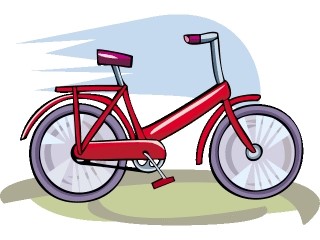
This page has two example travel conversations, both of which have been made into short videos. If you need any help understanding the vocabulary used in the example conversations or the cartoon videos then you can visit the ESL travel vocabulary page for definitions of many of the travel words used.
There are then 3 ESL travel conversation exercises for you to do that will help you practice using travel English. They are:
- A conversation where you have to fill in the blanks.
- Writing your own conversation.
- Some conversation topics so you can talk with your friends.
Conversation 1
Situation: Patrick, Andrew and Jane discuss how to travel to the city from the university campus.
Jane: Good morning, Andrew. Andrew: Good morning, Jane. Are you going somewhere? Jane: Yes. I and Patrick are going to the city to do some shopping and have lunch. Andrew: That sounds fun. How will you get there? Patrick: I want to take the train, but Jane prefers to ride her bicycle. Andrew: Don’t you like using the train, Jane? Jane: The train station is far away and riding my bicycle does not cost anything. Patrick: Ok. Jane, why don’t we travel by bus, there is a bus stop just behind the university. Jane: It might take longer. I think we will need to take two buses to the city centre. Andrew: Jane is right. There is not a direct bus into the city. Why don’t you use a taxi? Patrick: That will be quick, but expensive. Can you rollerblade? Jane: I hope you don’t mean we should rollerblade to the city. Andrew: Is rollerblading popular in America, Patrick? Patrick: Yes. People often use roller-skates. There is even a designated lane for it. Jane: In UK we can’t do that, the path is just for walking on. Andrew: I need to go to the train station to buy some tickets. I can give you both a lift in my car. Jane: That would be wonderful, Andrew. Thanks so much. Patrick: That is very kind of you, Andrew. Let’s go to the city centre!
Conversation 2
Situation: Tui talks with Lucy about her plan to go back to Thailand during half term.
Lucy: What are you doing, Tui? Tui: I’m planning my trip back to Thailand for the mid-term break. Lucy: That sounds exciting. Tui: Not really. I must do a lot of travelling to get back to my home. Lucy: Really? Why? How will you get home and how long will it take? Tui: It will take more than 24 hours because I have to use many different types of transport. Lucy: Will your family meet you at the airport in Thailand? Tui: No. I must take a bus from the airport to my home. The bus is very uncomfortable. Lucy: That does not sound nice. How will you get to London Heathrow airport? Tui: I think it will be cheapest to use the coach, but I have a lot of luggage. Lucy: That’s ok. Usually you can pay extra to take more luggage. Tui: Really? That’s good. Do you know where the bus station is from here? Lucy: Yes, you can walk there. It will only take you 5 minutes. Tui: Should I buy a ticket before travelling? Lucy: Buy your ticket online if you can. It is always cheaper online. Tui: I want to travel direct to London. Do they have direct buses to the airport? Lucy: Yes, it takes about 2 hours. Tui: Perfect! I will take the bus. I was thinking about a taxi, but it’s expensive. Lucy: So, when is your flight? Tui: Tuesday morning. I need to leave really early as I must check in three hours before. Lucy: Would you like to take some of my delicious homemade cake for your family? Tui: Thanks, Lucy. But I don’t think I can. The customs officer is usually really strict. Lucy: I understand. Have a safe journey and see you when you get back. Tui: Thanks, Lucy. See you soon!
ESL Travel Conversation Exercises
The 3 following ESL travel conversation exercises will help you get better at using English to have a conversation about traveling.
Exercise 1 – Fill in the Blanks
In this ESL travel conversation exercise you need to choose the correct option (A-D) to fill in each of the blanks in the following conversation. Once you have chosen the option to fill each blank just click on the get results button to show your score and the correct answers.
Situation: Bob travels by bus to the city centre.
Bob: Excuse me, driver. _____(1)_______. Driver: Yes. We go directly to the city centre. Bob: That’s great. I would like one ticket, please. Driver: _______(2)__________. Bob: No, I don’t. Driver: ________(3)___________. Bob: I would like a return ticket please. Driver: That will be 2.40, please. Bob: Here you go. ______(4)________. Driver: Yes, please press the buzzer when we get near, there is a bus stop opposite the mall. Bob: Thank you. How often do the return buses leave and when is the last bus this evening? Driver: Buses run every hour and the last bus is at 2 am. Bob: Thank you. You have been very helpful. Driver: You are welcome. No problem at all. ________(5)_________.
ESL Conversation
Exercise 2 – write a conversation.
For the second ESL travel conversation exercise you need to write a conversation that is similar to the ones above. You can chose what happens and how many people there are, but it should be related to travel. Write what each person would say to the other people. Once you have finished you should find a friend and then you can speak the conversation out loud to each other.
Exercise 3 – Conversation Topics
In this exercise there are two sets of ESL travel conversation topics. Working with a friend you should have a conversation where you answer the question. One person has set A and askes those questions to the person who has set B. Take turns to asks questions.
The questions have also been made into some conversation cards for you to download by clicking the picture.
Do you want to practice speaking more? Then download my ‘ 80 ESL Conversation Cards ’ ebook that has many more conversation questions.
Question set A
- What is the longest journey you have ever taken?
- Would you like to be the captain of a ship, why?
- How many different types pf transport have you ever used?
- Is it safe to travel in the country you come from?
- Have you ever had an accident while travelling?
Question set B
- Do you like travelling? Why?
- What do you like to do while travelling?
- Would you like to be the captain of an airplane, why?
- What is your favourite method of transport?
- Do you get ill when travelling?
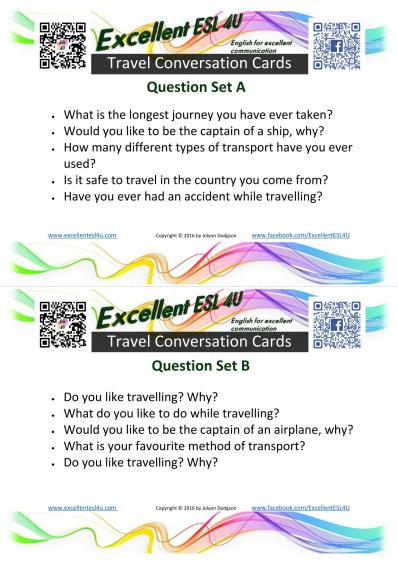
Other Pages about Travel that You Might Like
ESL Travel Listening ESL Travel Reading ESL Travel Vocabulary ESL Travel Writing
Excellent ESL 4U
New! Comments
Learn english, english idioms, kids english, contact excellent esl 4u, site information, recent articles, esl new year listening.
Dec 18, 16 03:17 AM

There are several ESL New Year listening tasks for you to do on this page so you can learn how to listen to the vocabulary.
ESL New Year Writing
Dec 11, 16 03:40 AM
This page has a range of ESL New Year writing exercises for you to do.
ESL New Year Conversation
Dec 04, 16 02:07 AM

There are example ESL New Year conversations on this page as well as some exercises and activities.

By Jolyon Dodgson , copyright © 2014-2020
www.excellentesl4u.com
Image © Graphics Factory.com

Asking for Information

Here are some sample phrases and sentences for asking information in English.
See also : Free-English-Study : Asking for Information
For Conversation practice:
Speaking Situations : Asking for Information
Grammar : This, That, These, Those
Grammar : Wh Questions
Textbook : New Interchange Intro , Chapter 3

free online ++
- Asking for Information
English Speaking Topic
How to ask for information in English?
Do you know how to ask for information in English? Listen to the conversation between a stranger and a local woman.
Learn more: 11 useful phrases to ask for help
Language Note:
1. Can you tell me…? / Can you show me …?
We usually use this phrase to ask for information. It is very common. A more formal way to say is “Could you tell me …?”
Can you tell me how to get to the nearest hospital? Could you tell us where the library is?
2. Do you know…? / Do you happen to know…?
We use this phrase when we are not sure if the person we are talking to knows the answer.
Do you know if the shopping mall is open now? Do you happen to know any police station near here?
3. Do you have any idea…?
We use this phrase to ask for other people’s idea if they know the answer.
Do you have any idea if I can buy some Coca near here? Do you have any idea where the National Museum is?
4. I wonder if you could tell me…
You think that the person you are talking to knows the answer and you ask them to give the information.
I wonder if you could tell me how to get to the bus station? I wonder if you could tell me where the post office is?
Learn more:
- Are there any restaurants near here?
- How to describe locations in English
- Talking about likes and dislikes in English
Leave a Comment Cancel Reply
Your email address will not be published. Required fields are marked *
Save my name, email, and website in this browser for the next time I comment.
This site uses Akismet to reduce spam. Learn how your comment data is processed .
- Dialogue 1 - Formal Greetings
- Dialogue 2 - Informal Greetings and Farewells
- Dialogue 3 - Formal Introductions
- Dialogue 4 - Informal Introductions
- Dialogue 5 - What Time Is It?
- Dialogue 6 - Telephone talk
- Dialogue 7 - Can You Say That Again?
- Dialogue 8 - Coincidences
- Dialogue 9 - Weather Report
- Dialogue 10 - Ordering a Meal
- Dialogue 11 - At the Doctor’s Office
- Dialogue 12 - What do you do?
- Dialogue 13 - What do you like to do?
- Dialogue 14 - Informal greetings and invitations
- Dialogue 15 - Formal greetings and invitations
- Dialogue 16 - Going green
- Dialogue 17 - Power from the Sun
- Dialogue 18 - Coffee for your plants
- Dialogue 19 - Reduce, reuse, recycle
- Dialogue 20 - Climate change effects
- Dialogue 21 - Isn’t rain good for the environment?
- Dialogue 22 - Suggestions using "let’s"
- Dialogue 23 - Going to the beach
- Dialogues 24 - Winter activities
- Dialogue 25 - In the Yard
- Dialogue 26 - At the Playground
- Dialogue 27 - Class Elections
- Dialogue 28 - Debate and Elections
- Dialogue 29 - After a Debate
- Dialogue 30 - Starting a business
- Talking about an accident
- Have you got any brothers and sisters?
- How to tell the time in English
- At the Airport Check-in
- Where are you from?
- Can I have your name?
- Your English is very good
- How to bargain in English
- Talking about life
- Did you have a good holiday?
- That sounds interesting
- How much and How many
- Introduce people and Greetings
- Do you want something to drink?
- Have you ever been to the Taj Mahal?
- At the restaurant
- Why don't you wear this shirt?
- Nice to meet you
- This is our new house
- Did you have a good weekend?
- Talking about characteristics
- Talking about things and stuff
- Ordering and Buying in English
- Asking someone to explain
- Speaking on the Phone
- Showing interest in a conversation
- Giving advice and suggestions
- Making a complaint in English
- How to show sympathy in English
- What are the people wearing?
- Agreeing, Disagreeing and Giving Opinions in English
- Happy Birthday Lucy
- Best way to carry money on a travel
- Starting an Informal Conversation
- How to respond and keep the conversation going
- How to exchange information in English

IMAGES
VIDEO
COMMENTS
Asking for Information at a Tourist Office - exercise 4Listening skill: dictation. Writing the exact words that you hear is an excellent way to practise your listening. It helps your ear recognise the sounds of English. Listen to four sentences from the dialogue and write one word in each gap.
a platform the area in a train station where you wait for a train. far a long way from somewhere. the right the side that is towards the east when you look north. board to get into a train, a ship or an aircraft to travel somewhere. a journey an occasion when you travel from one place to another. a return ticket a ticket for a journey to a ...
Hotel: General vocabulary 1. Hotel: General vocabulary 2. At the hotel 1: Checking in. At the hotel 2: Checking in. From the hotel into the city. At the reception desk. At the hotel 5: reservation. Hotel 6: Asking directions. What you like/don't like.
Asking for information travel dialogues(PDF) (see the Youtube video of this exercise) Asking for information. 7 Writing a conversation: booking a hotel picture dialogue and listening activity This is an ESL listening/speaking and writing lesson for practicing basic language for booking a room in a hotel. Students look at the pictures and write ...
Imagine you are going on a trip to the UK. You know someone who is from there. Ask politely for information: accommodation, transport, safety, money, food, shopping, sightseeing . Make recommendations to a foreign friend of yours who is coming to visit you in your country. English Conversation: Travel opinions.
Practice your English skills with this interactive dialogue about asking for tourist information. Learn new vocabulary and expressions with LearningApps.
Number 1 Excuse me, where's the subway station? It's along this road on the left. Can I walk? Sure. It's an easy 5 minute walk. Number 2 Do your rooms have wifi? Yes, certainly!
Elementary travel dialogues for English language learners. The answers and other exercises can be found at:https://eslflow.com/tourism-and-hotel-vocabulary-a...
English is often used in travel situations as a common language which many people can speak. This means that knowing some English phrases can make your trip safer and more fun, even if you're not traveling to a place where English is the official language. Travel is also an amazing reason to improve your English.
A fun lesson to learn how to recommend and suggest places to visit. A travel English lesson to improve English listening, vocabulary, idioms to ask for advic...
Travel Conversation Lessons Topics. Asking for Directions. It is extremely normal to get lost when travelling and then hunt for the right place. Wonderful travel talk between a tourist and a few bystanders guiding how to go to a place. Traveling is enjoyable, but it can be quite irritating when you are travelling overseas and are unable to ...
Teaching Point: Asking for Information, travel CEFR Level: A1 (adaptable) Around the world in? Aim: Learners practice asking for information about costs and times of flights. Topic: Travel. Time: 30 mins Concept: In this role-play activity, players attempt to travel around the world in the quickest time possible and for the least money. Note: This game starts and finishes in Buenos
By asking for recommendations, you can discover new places and experiences that you may not have found on your own. And by giving recommendations, you can share your own travel knowledge and help others have a great trip. In conclusion, learning some basic Tourist English phrases for socializing can help you make the most of your travel experience.
Airport English Conversation #3: On the plane. The people who work inside the airplane serving food and drinks are called flight attendants. Both men and women who have this job are called flight attendants. Listen to this conversation that Dan has with the flight attendant when dinner is served on the flight. 00:00.
Language: English (en) ID: 715336. 11/02/2021. Country code: LV. Country: Latvia. School subject: English as a Second Language (ESL) (1061958) Main content: Travel and tourism (2012779) Listening task about asking travel information. Other contents: comparatives.
Questions about traveling: If you could…. The next questions about traveling use a particular structure. We use "if you could" to talk about things or wishes that are unreal - but we'd really like to do. For instance, I'd really like to speak 7 languages fluently! If you could travel back in time, which historical era or event would ...
60 Travel Conversation Questions. Instead of having a long list of travel conversation questions, it is better to have them categorized to make everything easier. These are 60 travel conversation questions that have been divided into different categories such as: #1. Places. #2.
In this ESL travel conversation exercise you need to choose the correct option (A-D) to fill in each of the blanks in the following conversation. Once you have chosen the option to fill each blank just click on the get results button to show your score and the correct answers. Situation: Bob travels by bus to the city centre.
London to Paris. ESL Travel Information Role-Play - Speaking Activity: Asking and Answering Questions from Prompts, Communicative Practice - Pair Work - Pre-intermediate (A2) - 25 minutes. In this free travel information role-play activity, students practice conversations between a ticket agent and a customer where they ask and answer questions ...
Asking for Information. Free English Lessons: Asking for Information Video. Watch on. Here are some sample phrases and sentences for asking information in English. See also : Free-English-Study : Asking for Information. 1.
Go past = continue past something so that it is now behind you. Go across = cross something, like a road or crossroads. Go up = walk up a hill. Go down = walk down a hill. Go out of = exit. Go through = pass through something, such as a tunnel or a town. Let's hear some useful questions for when you want to ask for directions in English:
Jimmy: When you get to Steve Street, take your next right. It's on the corner, across from the cafe. Lisa: Thanks! I've just moved in, so I really don't know my way around yet. Jimmy: Oh, I know how you feel. We moved here a year ago, and I still don't know where everything is! Asking for and Giving Directions - Image 5.
We usually use this phrase to ask for information. It is very common. A more formal way to say is "Could you tell me …?". Can you tell me how to get to the nearest hospital? Could you tell us where the library is? 2. Do you know…? / Do you happen to know…? We use this phrase when we are not sure if the person we are talking to knows ...